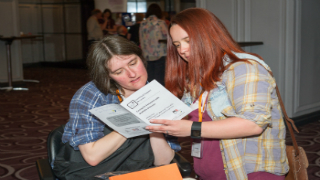Publicising your activities via local newspapers and radio can help raise awareness of MS, increase the profile of your group and attract new volunteers.
See Group Handbook B1: Availability, contact and communication
- Communications Volunteers
- Writing press releases
- When the press contacts you
- Political neutrality
- Choosing a case study
- Handling negative press
- Need support?
Communications Volunteers
Your Coordinating Team may choose to recruit one or more Communications Volunteers to maintain your group’s press and publicity.
- Find out more about our Communications Volunteers
Writing press releases
Press releases can be used to tell local media about your group activities. Often a friendly phone call is enough, but a press release can be useful if your chosen media outlet requests one or you want to contact a lot of different people in a short space of time.
To help you write a press release, we’ve put together some easy to use templates for:
Using our press release templates
- Use each template as a guide and adapt it for your own needs
- If the template references something that's not happening – like the appearance of a speaker at an information event – then change it to make sure it's relevant for your activity
- Make sure you've updated the dates on the template
- Keep the layout and font the same style and size
- Check that you have included all essential details in your press release before sending it out
When the press contacts you
A journalist may contact you directly if they want to illustrate how national policy or healthcare decisions will impact people locally, or they may require more information on a local event or group activities.
If the call is important or sensitive, or it concerns national, political or research issues, you must contact our Press Office before responding.
Only answer enquiries if you are sure of all the facts and be careful not to respond in a personal capacity – remember that you are representing us with your answer.
- Find out more about Representing the MS Society
Political neutrality
As a national charity, we must not be seen to endorse one political viewpoint, or one political party, over another.
- Listen to our podcast on political neutrality
- Read the podcast transcript
Choosing a case study
Illustrating an issue through a personal account from someone with MS (a ‘case study’) is a popular request from journalists. If you are asked to provide a case study, you must follow these guidelines:
Make sure the person you ask understands where their story will appear and how many people will see or hear it.
Only choose someone who is confident at talking about their MS and is happy to give out their name, age and be photographed.
If you think you might want to use their information again, you must obtain permission in writing using our consent form.
- Download a Consent Form
Handling negative press
Negative news about MS Society groups is rare, but if you are concerned about a potential negative story you must not ignore or avoid dealing with it – tell our Press Office straight away so we can help you prepare a response for if/when the media contacts you.
Need support?
Our Press Office is here to ensure we all generate great quality press coverage. You should keep them informed of your publicity activities.
- Get contact details for the Press Office



